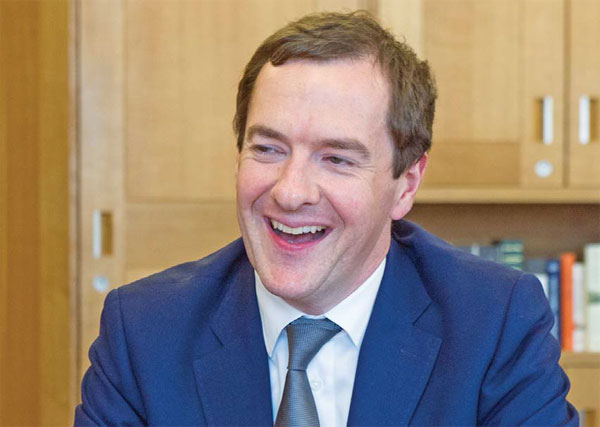'Golden Era' falls prey to new Cold War
By ANGUS MCNEICE in London | China Daily | Updated: 2020-07-24 07:33
Scholars gloomy on Sino-UK relations as US pressure puts neutrality on outer

Five years ago, Britain's then chancellor George Osborne spoke of his ambitions to usher in a gilded period of China-United Kingdom relations while aboard a bullet train in Chengdu, Sichuan, where he was courting Chinese investment in planned high-speed rail lines.
Weeks later, the UK's then prime minister David Cameron and President Xi Jinping toasted the "Golden Era" over pints at a country pub in Buckinghamshire.
Fast forward to today, and it is fair to say that the glister of the Golden Era is clouded by issues over Hong Kong and Huawei that have put the two nations at loggerheads amid the UK's tilt away from China in favor of closer connections with the US.
This week, on a visit to London, US Secretary of State Mike Pompeo praised the UK for its decision to ban Huawei from building 5G infrastructure, a measure the US has lobbied for aggressively.
Pompeo had earlier given European leaders the ominous ultimatum to choose "Washington or Beijing", leaving little room for neutrality in what some commentators are labeling as a new Cold War.
Martin Jacques, former senior fellow at the Department of Politics and International Studies at Cambridge University, said the UK has "given way to US pressure".
"I am not optimistic about the future of UK-China relations," Jacques told China Daily."The situation has regressed a long way since the optimism engendered in the UK-China relationship by the Cameron-Osborne government."
Christopher Bovis, a professor of international business law at Hull University, said Britain should proceed with "extreme caution" in order to avoid damaging the UK-China trade environment for "years to come".
"The UK is trying to align its trade policy with the US post Brexit," Bovis told China Daily. "Such an attempt reflects adversely on Sino-UK relations and poses a threat to Chinese investment policy in the UK."
The UK has further soured relations with China by suspending an extradition treaty with Hong Kong, in response to China's passing of the National Security Law for the special administrative region.
Chinese Ambassador to the UK Liu Xiaoming said the UK should not interfere in China's internal affairs, and "must bear all consequences for damaging bilateral relations".
'Dire prospect'
This could scarcely have come at a worse time for the UK. Earlier this month, Michel Barnier, the European Commission's head of the Task Force for Relations with the UK, said that "serious divergences remain" in ongoing talks over a trade deal between the UK and the European Union.
The UK now faces the dire prospect of exiting the EU without a deal, as the nation concurrently hurtles toward what the Bank of England predicts will be its worst recession in three centuries. This is all in the context of the Huawei ban, which will cause an estimated two-year delay to the UK rollout of 5G services and all the supplementary benefits that technological milestone will bring.
"The UK simply cannot afford to self-isolate from China," Jacques said."Having left the EU and joined the (new) Cold War against China, the prospects for the UK are, to put it mildly, not good."
There is perhaps a level of irony in the US asking countries to form an international coalition against China, as Pompeo did this week, since Washington has sought to systematically destabilize global alliances designed to safeguard humanity against existential threats, including the World Health Organization and the Paris Agreement on climate change.
This week, Pompeo leveled an accusation that backroom dealings with China cleared a path for Tedros Adhanom Ghebreyesus to assume his role as WHO director-general.
In response, the WHO said it "strongly rejects any ad hominem attacks and unfounded allegations".
Rana Mitter, director of the University of Oxford China Centre, said he is hopeful that China's and the UK's continued support of multinational efforts to confront global issues will somewhat ameliorate a further weakening of diplomatic relations.
"The UK will host the United Nations Climate Change Conference next year and will want to engage with China on that, while Washington is leaving the Paris Accord," Mitter said. "So, the UK and China will continue to engage with each other pragmatically in various areas despite the current more heightened atmosphere."
James Sassoon, a member of the House of Lords and president of the China-Britain Business Council, said he is optimistic that business dealings will continue to hum along in the background of heightened political tensions, as they did during an earlier diplomatic rift between the UK and China from 2011 to 2013.
Sassoon said that UK Prime Minister Boris Johnson, "who keeps reminding us that he is a Sinophile", will be keenly aware of the importance of trade and investment from China, the UK's second largest-trading partner outside the EU.
"Pompeo puts a very clear US position on these things, but I think the UK government understands what global Britain needs to do to forge a broad series of alliances," he said.
























